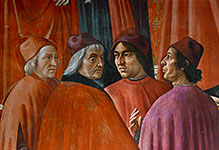
Zachary
Luke 1, 5 - 21
There was in the days of Herod, the king of Judaea, a certain priest named Zacharias, of the course of Abia: and his wife was of the daughters of Aaron, and her name was Elisabeth. And they were both righteous before God, walking in all the commandments and ordinances of the Lord blameless. And they had no child, because that Elisabeth was barren, and they both were now well stricken in years. And it came to pass, that while he executed the priest's office before God in the order of his course, According to the custom of the priest's office, his lot was to burn incense when he went into the temple of the Lord. And the whole multitude of the people were praying without at the time of incense. And there appeared unto him an angel of the Lord standing on the right side of the altar of incense. And when Zacharias saw him, he was troubled, and fear fell upon him. But the angel said unto him, Fear not, Zacharias: for thy prayer is heard; and thy wife Elisabeth shall bear thee a son, and thou shalt call his name John. And thou shalt have joy and gladness; and many shall rejoice at his birth. For he shall be great in the sight of the Lord, and shall drink neither wine nor strong drink; and he shall be filled with the Holy Ghost, even from his mother's womb. And many of the children of Israel shall he turn to the Lord their God. And he shall go before him in the spirit and power of Elias, to turn the hearts of the fathers to the children, and the disobedient to the wisdom of the just; to make ready a people prepared for the Lord. And Zacharias said unto the angel, Whereby shall I know this? for I am an old man, and my wife well stricken in years. And the angel answering said unto him, I am Gabriel, that stand in the presence of God; and am sent to speak unto thee, and to shew thee these glad tidings. And, behold, thou shalt be dumb, and not able to speak, until the day that these things shall be performed, because thou believest not my words, which shall be fulfilled in their season. And the people waited for Zacharias, and marvelled that he tarried so long in the temple.
The Protoevangelium of St. James
XXII.
1. But when Herod perceived that he was mocked by the wise men, he was wroth, and sent murderers, saying unto them: Slay the children from two years old and under.
2. And when Mary heard that the children were being slain, she was afraid, and took the young child and wrapped in swaddling clothes and laid him in an ox-manger.
3. But Elizabeth when she heard that they sought for John, took him and went up into the hill-country and looked about her where she should hide him: and there was no hiding-place. And Elizabeth groaned and said with a loud voice: O mountain of God, receive thou a mother with a child. For Elizabeth was not able to go up. And immediately the mountain clave asunder and took her in.
XXIII.
1. Now Herod sought for John, and sent officers to Zacharias, saying: Where hast thou hidden thy son? And he answered and said unto them: I am a minister of God and attend continually upon the temple of the Lord: I know not where my son is.
2. And the officers departed and told Herod all these things. And Herod was wroth and said: His son is to be king over Israel. And he sent unto him again, saying: Say the truth: where is thy son? for thou knowest that thy blood is under my hand.
3. And about the dawning of the day Zacharias was slain. And the children of Israel knew not that he was slain.
XXIV.
1. But the priests entered in at the hour of the salutation, and the blessing of Zacharias met them not according to the manner. And the priests stood waiting for Zacharias, to salute him with the prayer, and to glorify the Most High.
2. But as he delayed to come, they were all afraid: and one of them took courage and entered in: and he saw beside the altar congealed blood: and a voice saying: Zacharias hath been slain..
3. And after the three days the priests took counsel whom they should set in his stead: and the lot came up upon Symeon. Now he it was which was warned by the Holy Ghost that he should not see death until he should see the Christ in the flesh.